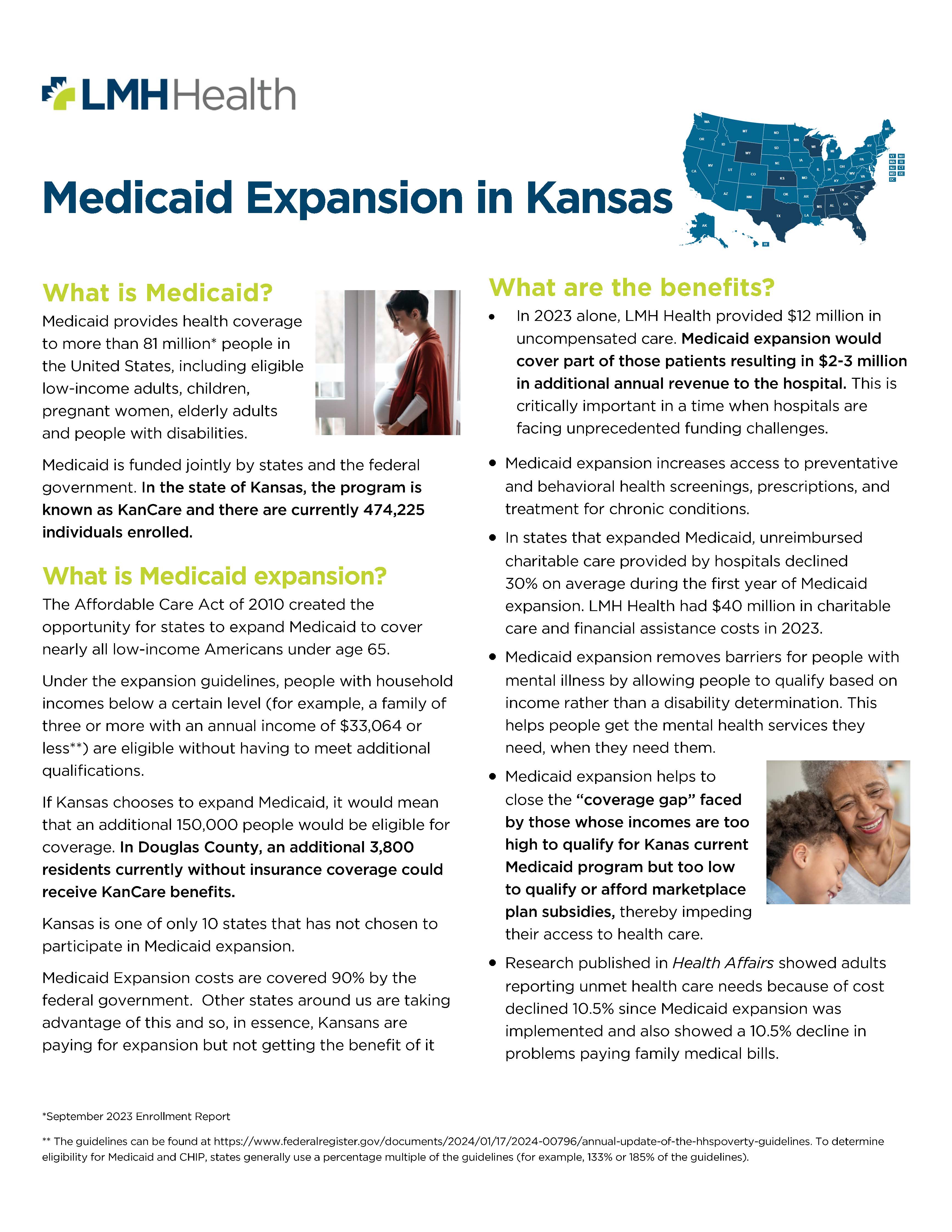Bridging the gap: Why Medicaid expansion matters
Hospitals and healthcare systems around the country are struggling to recover from the effects of the COVID-19 pandemic. Organizations must continue to absorb increases in labor wages and rising equipment, medication and supply costs.
According to the Kansas Hospital Association, more than 70% of Kansas hospitals had a negative operating margin in 2022 and 2023, with half of rural hospitals in danger of closing.
“All hospitals have had a difficult time over the last three to four years getting close to reaching an operating margin where they break even,” said Russ Johnson, LMH Health president and CEO. “It’s simply not sustainable. One possible solution for closing the gap is Medicaid expansion.”
What is Medicaid?
The Centers for Medicare and Medicaid Services (CMS) explains that Medicaid is a jointly funded federal and state program that provides health coverage to more than 81 million people in the United States, including eligible low-income families, children, pregnant women, elderly adults and people with disabilities. In Kansas, the program is called KanCare and serves 474,225 individuals.

Russ Johnson
The Affordable Care Act of 2010 created the opportunity for states to expand Medicaid to cover nearly all low-income Americans under age 65, also known as Medicaid expansion. Under the expansion guidelines, people who have household incomes below a certain level would be eligible to receive Medicaid. For example, a family of three with an annual income of $33,064 or less would be eligible for the program.
If Kansas chooses to expand Medicaid, it would mean that an additional 150,000 people would be eligible for coverage. In Douglas County, an additional 3,800 residents without health insurance could receive KanCare benefits.
“Forty other states have expanded Medicaid, including every one of our neighboring states,” Johnson said. “Adopting Medicaid expansion will help LMH Health to provide services and ensure that we remain an independent community hospital.”
What are the benefits of expansion?
One major benefit of Medicaid expansion is closing what’s known as the coverage gap. The Kaiser Family Foundation explains that adults who fall into this gap have incomes above the state’s Medicaid eligibility guidelines but below the poverty level, making them ineligible for subsidies in the health insurance marketplace available due to the Affordable Care Act. In Kansas, the current annual income limit for a family of three to be eligible for KanCare is $9,447.
In 1921, Elizabeth Watkins founded Lawrence Memorial Hospital, now known as LMH Health, stipulating that “no person shall be excluded on account of race, or physical, social or financial condition.” Her charge continues to this day. In 2022 alone, LMH Health provided more than $40 million in charitable care and financial assistance, a number that is only expected to grow. A portion of that care is supported through gifts to the LMH Health Foundation and the Help and Healing Fund.
“Almost all of us have felt the effects of inflation and wages increasing in recent years. For hospitals and healthcare providers, payments from Medicare and Medicaid have been far below these increased costs,” Johnson said. “At a time when hospitals are facing unprecedented funding challenges, expanding Medicaid brings in additional payment for the programs we provide and help to offset these rising expenses.”
Based on the services LMH Health provides in Douglas County, Johnson estimates that Medicaid expansion could result in an average of $6.5 million in gross annual revenue for the hospital. It may also make LMH eligible to participate in 340B drug pricing, a program that reduces drug costs for eligible outpatient programs, which is beneficial for patients.
What’s the cost?
The good news is that expanding Medicaid comes at no additional cost to Kansans. The federal government pays for 90% of the expansion costs and states pay the remaining 10%. Under the current model, federal tax dollars are leaving Kansas and supporting hospitals and healthcare providers in other states.
Johnson explained that the state’s portion would come from higher reimbursement rates for existing Medicaid recipients, additional federal funding and a hospital surcharge. It would not raise taxes.
“The surcharge is a tool commonly used by other states who have expanded to help fund the state’s 10% responsibility in the program,” he said. “It’s a means by which a hospital can contribute to funding expansion and a way in which the money doesn’t come from the state general fund. It’s similar to a program we currently have, so the mechanism is already in place.”
Will it increase access?
One of the arguments against Medicaid expansion is the idea that the addition of new patients will strain the capacity of healthcare providers to provide care. Johnson said the reality is far different. Primary care providers and specialists employed by LMH Health already care for patients, regardless of their ability to pay.
“Contrary to some of the rhetoric, expanding Medicaid is not going to overtax our providers,” he shared. “Expanding KanCare will provide more low-income individuals and families with healthcare coverage and helps maintain access to services. Our providers care for these patients now if they come to us, so we’re ready. This just enables us to be paid for those services.”
Expanding Medicaid will not only improve the health of Kansans, it will also help hospitals recruit and retain healthcare providers. Kansas hospitals currently compete for doctors and nurses with neighboring states who have expanded eligibility for Medicaid and get higher reimbursement, increasing their ability to pay higher wages.
“Medicaid expansion provides benefits to Kansans. Those whose income falls far short of being able to afford commercial insurance are without coverage, which is a risk to their health and the health of our communities,” Johnson said. “Expansion increases access to preventative and behavioral health screenings, prescriptions and treatment for chronic conditions. It allows people to get services they need when they need them. It’s simply the right thing to do.”
